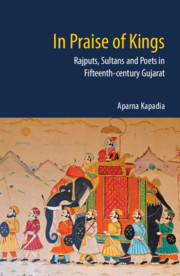Book contents
- Frontmatter
- Contents
- List of Maps
- Acknowledgements
- A Note on Transliteration and Usage
- Map
- Introduction
- 1 Setting the Stage: Contextualising Fifteenth-century Gujarat
- 2 Ranmallachanda: A Warrior Imagined
- 3 Gangadhara's Oeuvre: Cosmopolitan Poetry for Local Kings
- 4 Rājavinoda: The Sultan as Indic King
- 5 Rās Mālā: Re-Discovering a Warrior Past
- Conclusion
- Bibliography
- Index
Conclusion
Published online by Cambridge University Press: 20 October 2018
- Frontmatter
- Contents
- List of Maps
- Acknowledgements
- A Note on Transliteration and Usage
- Map
- Introduction
- 1 Setting the Stage: Contextualising Fifteenth-century Gujarat
- 2 Ranmallachanda: A Warrior Imagined
- 3 Gangadhara's Oeuvre: Cosmopolitan Poetry for Local Kings
- 4 Rājavinoda: The Sultan as Indic King
- 5 Rās Mālā: Re-Discovering a Warrior Past
- Conclusion
- Bibliography
- Index
Summary
Two conventional ideas have coloured our view of Gujarat's pre-modern history: first, as in the rest of the subcontinent, that the fifteenth century, a century of transitions, was merely a twilight during which nothing noteworthy happened; and second, that the period in which the regional Muslim sultanate (and later the Mughals) ruled, brought any regional creative and political processes to an abrupt end. As the influential politician K. M. Munshi wrote, 'these developments had a negative influence onthe literature of Gujarat’ and the literary productions in this era ‘not only ignored political conditions, but provided easy ways to forget them'. This narrative of the Chaulukya-Vaghelas being the last bastions of Gujarat's ‘Hindu’ culture, before it was destroyed by 'Muslim’ domination, continues to shape the popular imagination of the region's history. Munshi's views, which portray the history of pre-modern Gujarat in terms of religious binaries rather than as a period of complex collaborations, have had a lasting impact on the region's popular imagination as well.
In this book, I have tried to provide a corrective to this surprisingly persistent view that has shaped the understanding of Gujarat's and India's pre-modern history. I have shown that periods of change and flux, which do not necessarily coincide with large empires, may be productively examined by focusing on the political and cultural processes that were at work within regional and local contexts. Literary narratives offer a particularly rich source for unpacking this history in a century of transitions in which such texts were often the only sources left behind by critical political actors like the local chieftains. While the regional sultans do have a legacy of historical documents and other material remains, literary works add of nuance to the ways in which their rule might be understood.
The regional kingdoms and sultanates that evolved in the subcontinent in the fifteenth century gave impetus to what has been called the ‘vernacular millennium', but the regional languages were not the only ones that flourished in these new courts, or beyond them. Fifteenth-century polities, as is clear in case of Gujarat, were multilingual and multicultural, promoting classical and new regional styles of literature, architecture and other cultural effusions.
- Type
- Chapter
- Information
- In Praise of KingsRajputs, Sultans and Poets in Fifteenth-century Gujarat, pp. 158 - 164Publisher: Cambridge University PressPrint publication year: 2018



